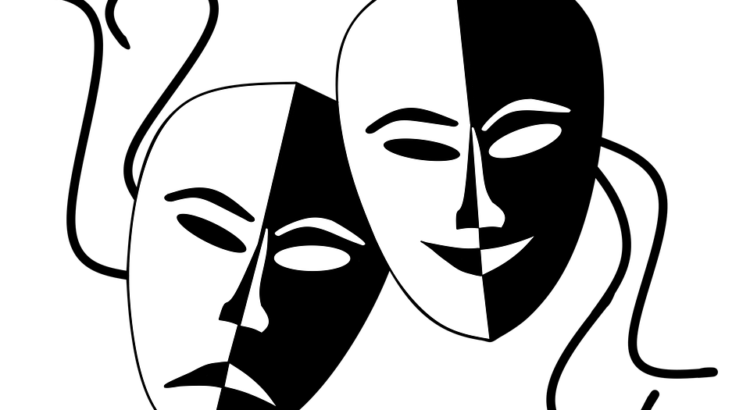Recently, I had the opportunity to portray “Dawn” in a production of The Universal Language by David Ives. The Universal Language is a short comedic play that features two characters, Dawn and Don. Dawn, a shy woman with a stutter, meets Don, a con artist aiming to trick customers into paying for lessons on a made-up language. Don teaches Dawn about Unamunda, the fraudulent language, until the two find themselves enthusiastically creating the language along the way. Gradually, Don and Dawn also learn more about each other, ultimately falling in love. This short play piqued my interest for several reasons. For one, I enjoyed performing and learning more about the comedic style of playwright David Ives. I also liked developing my character and learning about the real-life universal language.
I enjoyed playing my character, Dawn, and diving deeper into her motivations. Dawn had a unique dynamic with Don. She was naive but smart. Despite her apparent timidness, she displayed courage when initially going to Don’s “School of Unamunda.” Her stutter affected how she was viewed by others, but she took initiative in coming out of her shell and reaching out to Don. Her purpose in doing so was a result of her poetic and optimistic view of the world. At one point, she revealed the reasoning behind wanting to learn Unamunda – she held the belief that language was a form of music and communication, a vessel for uniting humans and thus eliminating loneliness. Dawn’s pure-hearted motive, drive, and curiosity in learning Unamunda negated her foolishness in originally falling for Don’s scam. In the play, she started out shy but ended up more confident and outspoken, thanks to Don and their newly-acquired language. I commend her kindness and passion for learning that even swayed her scammer into falling in love with her. In playing Dawn, I enjoyed conceiving this character from my own interpretations of the play. In addition, incorporating a stutter that gradually faded as time went on was challenging but interesting to work with. I also thought it was interesting to develop fluidity with Unamunda, and to overall perform a piece centering on a made-up language.
Throughout the dramatic process, both the challenges experienced and the research done pertained to the “universal language” in the play. Memorizing lines was particularly tricky because the words were made-up, and this unfamiliarity made a typical task into a bit of a chore. The seemingly hodgepodge of words and sounds resembled a mix of English, Spanish, German, French, and Latin. The language also referenced old slang and included allusions to pop culture, such as names of actors (“Johncleese,” “Melgibson,” etc.). Yet, while Unamunda is made up, there is an actual “universal language” called Esperanto. Esperanto is an international language that was designed to be easier to learn than other languages. Created by Ludwig L. Zamenhof, its goal was to foster communication between language communities and people from different countries. Interestingly, the language has sixteen regular grammar rules with no exceptions like irregular verbs. This simplicity makes it practical to teach internationally. When learning this, it surprised me how much the language is still used to this day. There are books, films/videos, and broadcasts in Esperanto. There are hundreds of Esperanto organizations and two million speakers worldwide. In additional to Esperanto associations, there are various apps, websites, and other tools that teach Esperanto and allow speakers to connect to other speakers across the globe.
Click here for more information about Esperanto


